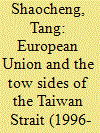| Srl | Item |
| 1 |
ID:
097027


|
|
|
|
|
| Publication |
2010.
|
| Summary/Abstract |
The author uses content analysis to examine the European Union's (EU's) policy on relations between the two sides of the Taiwan Strait from 1996 to 2009. During this period, the EU devoted increasing amounts of attention to this flashpoint in East Asia. For geographical reasons, theEU has fewer strategic interests in this region than the United States. Therefore trade and economic interests are high on the EU agenda. Nonetheless,these interests can only be secured if there is peace and stability between the two sides of the Strait. The entry of new member states into the EU since 2004 may have influenced its policy on cross-Strait relations. The firm adherence to democratic values among EU member states is the main reason behind the incessant friction between these states and China. This culminated in the abrupt canceling of the eleventh Sino-EU summit meeting by Beijing in protest at the Dalai Lama's tour of Europe in 2008.Thanks to the change of government in Taipei in May that year, a new era of reconciliation with Beijing has begun. This gives China a free hand to tackle other issues of interest. Also, China has sufferedmuch less from the recent global financial crisis than either the United States or Europe. Yet there is too much at stake for both China and the EU for them to be at odds with each other in the long run.
|
|
|
|
|
|
|
|
|
|
|
|
|
|
|
|
| 2 |
ID:
097026


|
|
|
|
|
| Publication |
2010.
|
| Summary/Abstract |
The rise of China, the European Union's (EU's) increasing trade deficit with the People's Republic of China (PRC), and the ongoing negotiations on a new cooperative agreement have all recently contributed to the growing debate over the EU's China policy. Following the coming into effect of theLisbon Treaty, new trends in Asian integration and particularly the fruitful détente between the PRC and Taiwan have been exerting increasing pressure on the EU to rethink and reformulate its current strategy on China and its policy toward Taiwan. A reviewof the development of the EU-Taiwan relationship over the past three decades will be followed by an analysis of the structural factors that have shaped it. Emerging new factors will be examined and their probable consequences for this bilateral relationshipwill be evaluated in order to understand the measures that the EU may adopt in the Taiwan Strait in the new regional and inter-regional context. According to the author's analysis, the EU is under increasing pressure to adopt a more active and politicized strategy in the Strait. In pursuit of its long term interests, the EU should cooperate with the United States vis-à-vis the PRC and insist upon its core values during its engagement in the Strait.
|
|
|
|
|
|
|
|
|
|
|
|
|
|
|
|